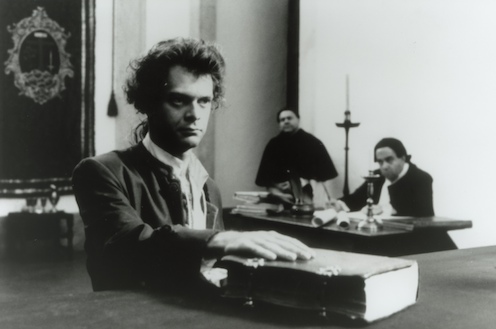The Jew (O Judeu)

Full Description
In 18th-century Portugal, Antonio da Silva was considered the most talented and popular writer with a reputation comparable to Moliècvre. Da Silva, however, was also a converso, or hidden Jew, whose fearlessness and adventurous spirit, portended trouble, and literary obscurity. The story of the writer's demise is the centerpiece of O JUDEU, a fascinating and lushly realized Portuguese-Brazilian co-production. In a time of Inquisitors from the Holy Office, a bankrupt Monarchy, and bawdy nights in crowded bars, da Silva is an irreverent playwright who entertained audiences with his puppet plays. When his outspoken cousin is denounced as a Jew by her lover, the entire family is implicated. Some relatives resist; others are driven mad. The writer is imprisoned and tortured by Inquisitors. He survives these sessions by turning to his memories of young love and his budding artistic career. Not even the efforts of the King's own deputy can thwart a lethal betrayal. Da Silva was publicly burned at the stake in October 1739. This gripping drama captures the style and mood of a period marked by both majesty and hypocrisy. 1996 Jerusalem International Film Festival.
Filmmaker Bio(s)
Jom Tob Azulay, 49, attended the School of Cinema in Los Angeles from 1971 to 1974 at the University of Southern California (USC), the University of California (UCLA), and the California Institute of the Arts (Cal Arts). He also attended a special seminar given by Slavko Vorkapich on "The Visual Nature of the Film Medium".
From 1974 on, Jom Tob worked as Director of Photography and Scmnd Engineer for numerous pictures, including "Muito Prazer" by Brazilian Director Davi Neves, for which he won the award for Best Cinematography in the XII FiIrn Festival of Brasilia, 1979.
In 1975 Jom Tob set A & B Producoes, Ltda, in the Brazilian city Rio de Janeiro. From that time, the company has been responsible for an acclaimed series of documentaries, shorts and numerous educational videos, such as "EXU Mangueira", "Euphrasia" (nominated for the Gold Medal at the Gramado Festival of Film), "A Exposição Crão", "Torneiro Amilcar Cabral", "O Alquimista do Mate" (sponsored by the National Art Foundation) and "Ilha Granck" (awarded for Best Script by the Brazilian Government Tourism Bureau). To date, Jom Tob Azulay has produced and directed over a hundred commercial films and videos.
In addition, Jom Tob has produced and directed severaI films, most notably "Heart Pounding Beat" in 1983. The latter was the first Brazilian film made in Dolby Stereo, This film was also nominated to the Grenoble Film Festival in 1984, the Filmex Festival as well as the Biarritz Festival of 1984.
Jom Tob Azulay has, on request, taught Cinema at the Federal University of the State of Rio de Janeiro. He has also published articles in both newspapers and journals on the subject of cinema and mass media.
Director(s)
Country(ies)
Language(s)
w/English Subtitle
Release Year
Festival Year(s)
Running Time
85
